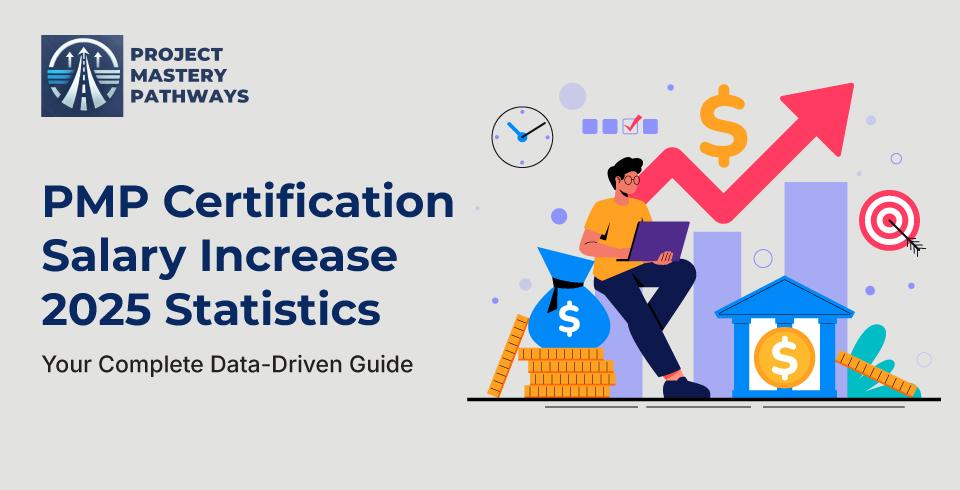Are you struggling to determine whether investing time and money in PMP certification is worth it for your career growth? With project management roles becoming increasingly competitive and organizations demanding higher expertise, many aspiring project managers wonder if the PMP credential truly translates into tangible financial benefits. The answer is a resounding yes – and the 2025 data proves it with compelling statistics that will help you make an informed decision about your certification journey.
The Financial Impact of PMP Certification: Latest 2025 Statistics
The most recent data from the Project Management Institute’s 13th edition salary survey reveals remarkable earning potential for PMP-certified professionals. According to PMI’s latest research, respondents holding the Project Management Professional (PMP) certification reported higher median salaries than project management practitioners without a PMP certification – 33% higher on average across the 21 countries surveyed. This represents a significant increase from previous years and demonstrates the growing value organizations place on certified project management expertise.
PMP vs Non-PMP Salary Comparison in the United States
| Certification Status | Median Annual Salary | Percentage Difference |
|---|---|---|
| PMP Certified | $120,000 – $122,000 | Base |
| Non-PMP Certified | $93,000 | 29% lower |
| Salary Premium | $27,000 – $29,000 | 33% higher |
According to the U.S. Bureau of Labor Statistics (BLS), in the fourth quarter of 2024, the median annual income was approximately $61,984 for full-time wage and salary workers in the United States. In comparison, the Project Management Institute (PMI) reports that project management professionals holding the Project Management Professional (PMP) certification in the United States have a median annual salary of $120,000.
The data becomes even more compelling when we examine global trends. About two-thirds (66%) of the survey participants reported that their total compensation (including salary, bonus, and other cash incentives) increased over the 12 months before completing the survey. For those receiving compensation increases, 61 percent report increases of at least 5 percent over that period.
Regional Salary Variations: Where PMP Certification Pays Most
Understanding geographic salary differences is crucial for career planning. The PMI salary survey data reveals significant variations across different countries and regions.
Top-Paying Countries for PMP Professionals (2025)
| Country | Median Annual Salary (USD) |
|---|---|
| United States | $120,000 |
| Australia | $103,789 |
| Germany | $99,512 |
| United Kingdom | $87,993 |
| Singapore | $79,464 |
The countries where project practitioners report the highest median salaries are the United States (US$120,000), Australia (US$103,789), Germany (US$99,512), United Kingdom (US$87,993), and Singapore (US$79,464).
Within the United States, specific metropolitan areas offer even higher compensation. In Arlington, VA, and surrounding areas, Amazon, General Dynamics Information Technology, and IGNITEC are among the employers seeking qualified candidates to fill project management roles that pay an annual salary between $80,000 and $180,000. Similarly, PMP Certified Professionals in San Francisco are being courted by Dropbox, the City and County of San Francisco, DocuSign, and more to fill 194 open positions with salaries surpassing $125,000 per year.
Experience-Based Salary Progression for PMP Professionals
One of the most encouraging aspects of PMP certification is how it accelerates salary growth throughout your career. The data shows clear progression patterns based on experience levels.
PMP Salary by Experience Level (United States)
| Experience Level | Salary Range | Average Salary |
|---|---|---|
| Less than 3 years | $75,000 – $85,000 | $80,000 |
| 3-5 years | $90,000 – $105,000 | $97,500 |
| 5-10 years | $105,000 – $120,000 | $112,500 |
| 10-20 years | $125,000 – $140,000 | $132,500 |
| 20+ years | $145,000+ | $150,000+ |

According to PMI, here’s how salary trends shift with experience for PMP-certified professionals in the U.S.: Less Than 3 Years of Experience: Average salary is around $75,00-$85,000. 3 to 5 Years of Experience: Salaries increase to approximately $90,000-$105,000. The progression continues with 5 to 10 Years of Experience: Most professionals earn $105,000-$120,000. 10 to 20 Years of Experience: Salaries typically reach $125,000-$140,000. Over 20 Years of Experience: Senior project managers and directors often earn $145,000 or more.
Particularly noteworthy is the impact on early-career professionals. Getting your PMP certification may be particularly worthwhile if you’re early in your career. US-based project managers with three or fewer years of experience enjoy an increase of about 30 percent once they earn their PMP certification.
Industry-Specific Salary Analysis
The industry you choose significantly impacts your earning potential as a PMP-certified professional. Recent data shows substantial variations across different sectors.
PMP Salary by Industry (United States)
| Industry | Average Annual Salary |
|---|---|
| Pharmaceutical | $131,833 |
| Legal | $130,402 |
| Government | $116,000+ |
| Research & Development | $120,466 |
| Information Technology | $114,447 |
Those who earn their wages on the government payroll fetch just over $116,000 per year, while those in the private sector bring home $130,402 when working in the legal arena and $131,833 in the pharmaceutical industry. Additionally, those working under the arm of an IT department of an organization earn an average annual salary of $114,447, for example, while the mean for those in Research and Development is $120,466.
Job Title Impact on PMP Certification Salaries
Your specific role and level of responsibility directly correlate with compensation levels. Understanding these hierarchies helps in career planning and salary negotiations.
PMP Salary by Job Title (United States)
| Job Title | Salary Range | Average Salary |
|---|---|---|
| Project Executive | $141,500 – $196,500 | $169,000 |
| PMO Lead | $123,000 – $180,000 | $151,500 |
| SAP Project Manager | $124,000 – $177,500 | $150,750 |
| Director of PM/PMO | $130,000 – $150,000 | $140,000 |
| Program Manager | Up to $185,000 | $150,000 |
| Project Manager III | $105,000 – $120,000 | $112,500 |
| Project Manager II | $90,000 – $105,000 | $97,500 |
| Project Manager I | $85,500 – $95,000 | $90,250 |
In the US, a PMP certification salary can range from a median of $85,500 for those with the title of Project Manager I to $158,500 for Directors of Project Management. The data shows that a project executive leads a company’s project management team, overseeing strategic planning and the progress of multiple projects. This role requires 10-15 years of experience in project management and commands the highest compensation levels.
Return on Investment: PMP Certification vs MBA
When considering professional development investments, it’s valuable to compare PMP certification with other credentials like an MBA. The financial analysis strongly favors PMP certification.
Investment Comparison: PMP vs MBA
| Credential | Cost | Time Investment | Median Salary Difference |
|---|---|---|---|
| PMP Certification | $2,555 – $3,305 | 3 months | <$1,000 difference |
| MBA | $60,000+ | 18-24 months | from MBA |
You can obtain your PMP certification in three months at the cost of $2555 – $3305. To earn your MBA, you’ll need to commit 18-24 months and can expect your expenses to start at $60,000. PMI’s Salary Survey found that respondents with a master’s degree and those with PMP certification achieved a mean salary that differed by fewer than $1000.
The return on investment (ROI) for PMP certification is remarkable. For a PMP Certified professional, an investment equal to slightly more than one workweek is required both financially and practically. For a professional who pursues an MBA instead, 26 weeks of their post-degree wages will be required to recoup their investment, and 1.5 to 2 years will be required of them.
Conclusion: Making Your PMP Investment Decision
The 2025 statistics paint a clear picture: PMP certification delivers substantial and measurable financial benefits throughout your career. With a 33% salary premium over non-certified professionals and consistent growth potential across experience levels, industries, and geographic regions, the certification proves its worth as a strategic career investment.
Whether you’re an aspiring project manager looking to break into the field or an experienced professional seeking to accelerate your career trajectory, the data demonstrates that PMP certification is more than just a credential – it’s a pathway to significantly enhanced earning potential and professional recognition.
Ready to take the next step in your project management journey? For comprehensive PMP exam preparation and expert guidance, explore the educational resources available on PMPwithRay where you’ll find detailed study strategies and exam tips. To develop deeper project management skills and prepare effectively for your certification, consider enrolling in specialized PMP courses on Udemy that provide structured learning paths designed by industry experts.
For more insights on PMP certification requirements and career planning, check out this comprehensive guide on PMP Certification Eligibility Requirements and learn about Why Get a PMP Certification in 2025. Additionally, if you’re ready to begin your preparation journey, explore the PMP Certification Exam 35 PDU Training course designed to meet all your certification requirements.

